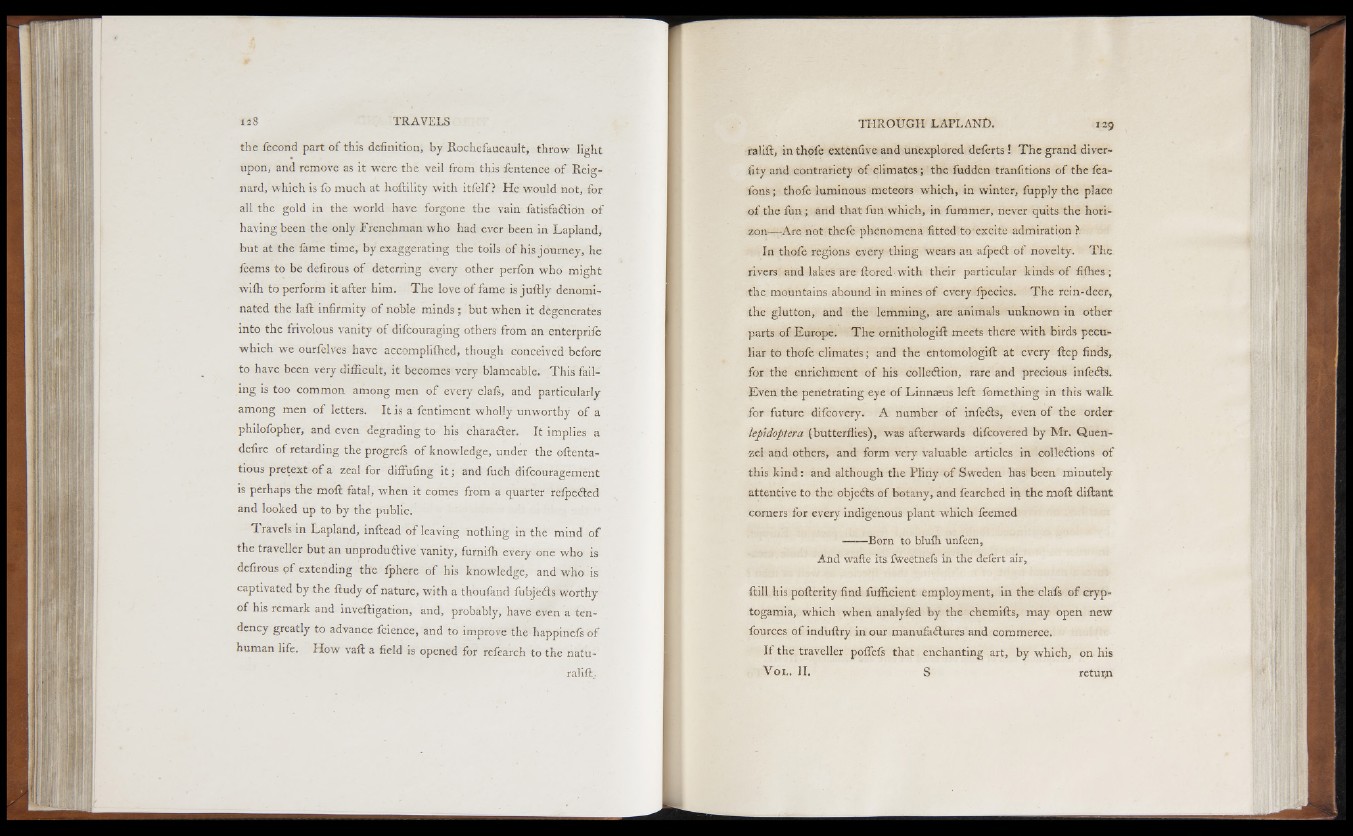
the fécond part of this definition, by Rochefaucault, throw light
upon, and remove as it were the veil from this fentence o f Reig-
nard, which is fo much at hoftility with itielf ? He would not, for
all the gold in the world have forgone the vain fatisfadiOn of
having been the only Frenchman who had ever been in Lapland,
b ut at the fame time, by exaggerating the toils of his journey, he
feems to be defirous of deterring every other perfon who might
wilh to perform it after him. The love of fame is ju llly denominated
the laft infirmity of noble minds ; but when it dégénérâtes
into the frivolous vanity o f difcouraging others from an enterprife
which we ourfelves have accompliihed, though conceived before
to have been very difficult, it becomes very blameable. This failing
is too common among men of every clafs, and particularly
among men of letters. I t is a fentiment wholly unworthy o f a
philofopher, and even degrading to his charader. It implies a
defire of retarding the progrefs of knowledge, under the oftenta-
tious pretext of a zeal for diffufing it ; and fuch difcouragement
is perhaps the moft fatal, when it comes from a quarter refpeded
and looked up to by the public.
1 ravels in Lapland, inftead of leaving nothing in the mind of
the traveller but an unprodudive vanity, furnifh every one who is
defirous of extending th e fphere of his knowledge, and who is
captivated by the ftudy of nature, with a thoufand fubj'eds worthy
of his remark and inveftigation, and, probably, have even a tendency
greatly to advance fcience, and to improve the happinefs of
human life. How vaft a field is opened for refearch to the natural
ift.
ralift, in thpfe extcnfive and unexplored deferts ! T h e grand diver-
fity and contrariety of climates; the fudden tranfitions o f the fea-
fons; thofe luminous meteors which, in winter, fupply the place
o f the fu n ; and that fun which, in fummer, never quits the horizon—
Are not thefe phenomena fitted to excite admiration ?
In thofe regions every thing wears an afped of novelty. The
rivers and lakes are ftored with their particular kinds o f fiihes ;
the mountains abound in mines of every fpecies. T h e rein-deer,
the glutton, and the lemming, are animals unknown in other
parts of Europe. T h e ornithologift meets there with birds peculiar
to thofe climates; and the entomologift at every ftep finds,
for the enrichment of his colledion, rare and precious infeds.
Even the penetrating eye of Linnaeus left fomething in this walk
for future difcovery. A number of infeds, even of the order
lepidoptera (butterflies), was afterwards difcovered by Mr. Quen-
zel and others, and form very valuable articles in collodions of
this k in d : and although the Pliny of S weden has been minutely
attentive to the objeds of botany, and fearched in the moft diftant
corners for every indigenous plant which feemed
Born to bluih unfeen,
And wafle its fweetnefs in the defert air,
ftill his pofterity find fufficient employment, in the clafs of cryp-
togamia, which when analyfed by the chemifts, may open new
fources of induftry in our manufadures and commerce.
If the traveller poffefs that enchanting art, by which, on his
V o l . II. S return